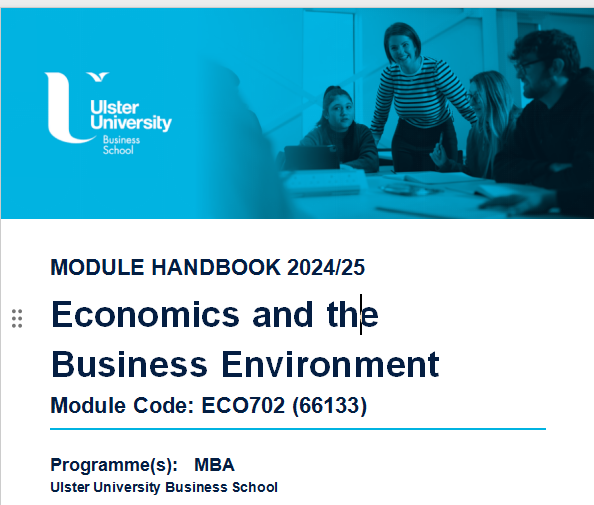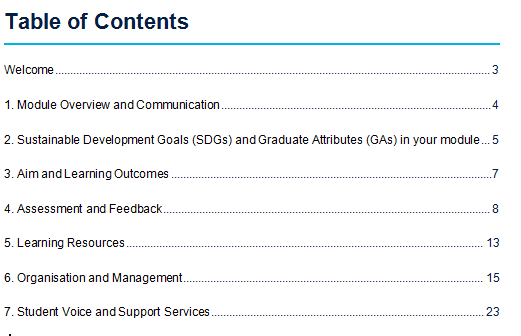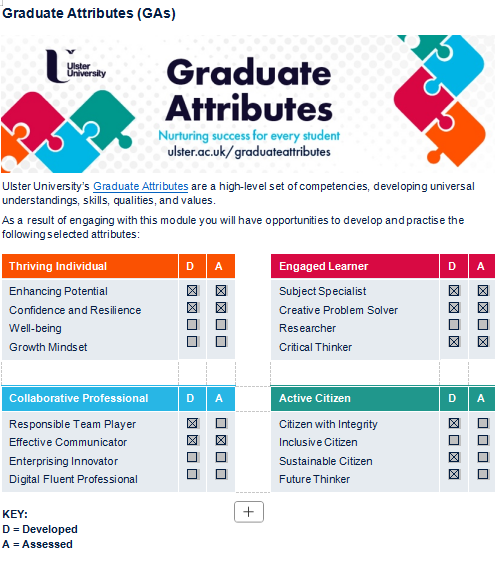| Category | Assignment | Subject | Economics |
|---|---|---|---|
| University | Ulster University | Module Title | ECO702 Economics and the Business Environment |


|
Module Title |
Economics and the Business Environment |
||
|
Module Code |
ECO702 |
Module Level |
7 |
|
Credit points |
15 |
Module Status |
Core Core |
|
Semester |
2 |
Location |
Belfast, Birmingham, Manchester, London |
|
Delivery Mode |
Face-to-face |
||
|
Contact Details and Communication Methods |
|||
|
Module Leader |
Emmanuel Agboola (See cover sheet above for contact details) |
||
|
Teaching Staff Contact Details |
Akin Sharimakin (Akinsehinwa.Sharimakin@qa.com) Birmingham Campus Dalene Matthew (Dalene.Matthews@qa.com) London Campus Abu Mahmud (Abu.Mahmud@qa.com) Manchester Campus |
||
|
General Information, Queries and Consultations |
If you require advice on any aspect of the module, please read the guidance provided here, in the Module Handbook. For General Queries, please utilise the class Discussion Board. For Specific Queries or studies advice, you can avail of the ‘Virtual Office Hours.’ Please contact Dr. Emmanuel Agboola if you have questions relating to the module or wish to schedule an appointment. Please note, we aim to respond to emails within 48 hours during the working week. |
||
|
Module Announcements |
Key announcements will be presented during tutor-led activities. Out of class communication including notifications, reminders, etc will be distributed via the Blackboard Announcement tool. You will receive a duplication of the announcement direct to your student email inbox. It is essential that you check your emails regularly. It also advisable that you download the ‘Blackboard’ App as an alternative to access these announcements, notifications, and reminders as well as content. |
||
Sustainable Development Goals (SDGs)
The UN SDGs are a comprehensive set of global goals to end poverty, protect our planet, and improve living conditions of the Global Population. You are encouraged to think critically and reflect on SDGs in the context of this module.
The following SDGs are relevant in the context of this module:


This module examines the internal and external environments within which firms must operate and helps managers to audit their business environment to establish a strategic approach to their business activity.
To introduce managers to the principles of economics as they apply to the business environment. The aim is to enhance mangers' understanding of, and ability to adapt to, changes in the environments in which they operate.
To develop systematic analytical techniques based on rigorous economic principles.
What you should be able to do by the end of this module?
Successful participants will be able to:
What you need to do to demonstrate achievement of learning?
This module will be assessed via two items of assessment
|
Type / Element |
Assessment method |
Percentage (%) and word count equivalent |
Feedback due date |
|
Element 1 Coursework 1 |
2–Hours constrained time assessment takes place during class time in Week 8, W/C 28th July 2025. This will be delivered during the usual time-tabled session in Week 8. In-class Open Book Test. |
50% (1500 words equivalent) |
20 working days post submission date (via Blackboard Ultra) |
|
Element 2 Coursework 2 |
Written assignment, to be submitted by noon on Friday 29th August 2025.
|
50% (1500 words equivalent) |
20 working days post submission date (via Blackboard Ultra) |
Please note: Words in excess of +10% of the word count will not be marked.
Are You Looking The Solution of ECO702 Assignment
Order Non Plagiarized AssignmentAssessment Task
Coursework 1 – BRIEF
a)The assignment may take the form of an individual:
i)Written in-class test
b)Detailed assessment guidance will be made available in your Blackboard Module Assessment Folder.
c)Completed assignments must be submitted in class following the summary assessment information provided above.
d)All submitted assignments should have the file name:
i)"SurnameFirstNameBNumber"
ii)e.g. BrownJohnB00001234_AssignmentOne.
Feedback on the assessment will be provided via Blackboard and inclass in Week 9.
Coursework 1 – ASSESSMENT RUBRIC/MARKING PROFORMA
|
% Range |
Analysis and Synthesis of Content (30%) |
Application of Economic Theory and Models (30%) |
Evidence of Reading and Referencing (15%) |
Academic and Professional Skills: (15%) |
|
70-100 Distinction |
Critical insightful evaluation and synthesis of complex issues. Demonstrating exceptional knowledge and a high level of originality and reflection. |
Extensive evidence of advanced applications and empirical results. |
Extensive evidence of integrating supplementary sources. Outstanding referencing. |
Outstanding, well-directed presentation, logically and coherently structured, using correct grammar, spelling and citation. |
|
60-69 Commendation |
Critical evaluation and synthesis of complex issues. Demonstrating wide knowledge of material which includes an original and reflective approach. |
Clear evidence of advanced applications and empirical results. |
Good evidence of integrating supplementary sources. Comprehensive referencing. |
Excellent presentation, logically structured, using correct grammar, spelling and citation. |
|
50-59 Pass |
Some critical evaluation and synthesis of complex issues and material. Demonstrating appropriate knowledge of material and key issues. |
Evidence of advanced applications and empirical results. |
Evidence of reading appropriate supplementary sources. Adequate referencing. |
Orderly presentation, clear structure, using acceptable grammar, spelling and citation. |
|
45-50 Marginal Fail |
Limited evaluation and synthesis of issues and material. Limited of superficial knowledge. |
Limited evidence of advanced applications and empirical results. |
Limited evidence of reading appropriate supplementary sources. Inadequate referencing. |
Weak presentation, structure, grammar, spelling and citation. |
|
<45 Fail |
Little or no evidence of relevant knowledge. |
Little or no evidence of applications and empirical results. |
Little evidence of reading appropriate supplementary sources. |
Poor presentation, structure, grammar, spelling and citation. |
Assessment Task
Essay Questions
a)The assignment may take the form of an individual:
i)word-processed report.
b)Detailed assessment guidance will be given during seminars.
c)Completed assignments must be submitted in Word format via the Turnitin Dropbox in your Blackboard Course Area by the specified date and time outlined in the Key Assessment Information Table above.
d)All submitted assignments should have the file name:
i)"SurnameFirstNameBNumber"
ii)e.g. BrownJohnB00001234_AssignmentOne.
Written feedback on the assessment will be provided via Blackboard.
Coursework 2 – ASSESSMENT RUBRIC/MARKING PROFORMA
|
% Range |
Analysis and Synthesis of Content (30%) |
Application of Economic Theory and Models (30%) |
Evidence of Reading and Referencing (15%) |
Academic and Professional Skills: (15%) |
|
70-100 Distinction |
Critical insightful evaluation and synthesis of complex issues. Demonstrating exceptional knowledge and a high level of originality and reflection. |
Extensive evidence of advanced applications and empirical results. |
Extensive evidence of integrating supplementary sources. Outstanding referencing. |
Outstanding, well-directed presentation, logically and coherently structured, using correct grammar, spelling and citation. |
|
60-69 Commendation |
Critical evaluation and synthesis of complex issues. Demonstrating wide knowledge of material which includes an original and reflective approach. |
Clear evidence of advanced applications and empirical results. |
Good evidence of integrating supplementary sources. Comprehensive referencing. |
Excellent presentation, logically structured, using correct grammar, spelling and citation. |
|
50-59 Pass |
Some critical evaluation and synthesis of complex issues and material. Demonstrating appropriate knowledge of material and key issues. |
Evidence of advanced applications and empirical results. |
Evidence of reading appropriate supplementary sources. Adequate referencing. |
Orderly presentation, clear structure, using acceptable grammar, spelling and citation. |
|
45-50 Marginal Fail |
Limited evaluation and synthesis of issues and material. Limited of superficial knowledge. |
Limited evidence of advanced applications and empirical results. |
Limited evidence of reading appropriate supplementary sources. Inadequate referencing. |
Weak presentation, structure, grammar, spelling and citation. |
|
<45 Fail |
Little or no evidence of relevant knowledge. |
Little or no evidence of applications and empirical results. |
Little evidence of reading appropriate supplementary sources. |
Poor presentation, structure, grammar, spelling and citation. |
The teaching plan/order of weekly topics is subject to change. The list below provides an outline summary of weekly activities and further information is available on BBL in the relevant week’s folder. Students will be expected to engage in all prescribed activities that contribute towards final assessment.
|
Week/L&T Methods |
Curriculum Content/Topic Title |
Independent/Directed Study, includes: Required Reading, Seminar Preparation, and/or Assessment Preparation and due dates |
|
Week 1 Lecture
|
Module Welcome: Economics for Business Leaders & The Theory of Demand Introductions and Student Voice – Expectations of the module Overview of Module Handbook Overview of the Blackboard Area Content: Economics for business leaders. Understanding the demand side of the market and consumer choices. |
Reading: Begg & Ward: 1. Economics for business; 2. Consumers in the marketplace; |
|
Week 1 Seminar |
Seminar Topic/Task: Introduction to Economics |
N/A |
|
Week 2 Lecture
|
Lecture Title: Supply Content: Understanding the supply side of the market. Theory of production and cost |
Reading: Begg & Ward: 3. Firms in the marketplace. |
|
Week 2 Seminar |
Seminar Topic/Task: Consumer behaviour |
Worksheet 1: Demand and Elasticity |
|
Week 3 Lecture
|
Lecture Title: Market Equilibrium Content: Understanding markets in action. Price controls. |
Reading: Begg and Ward: 4. Markets in action |
|
Week 3 Seminar |
Seminar Topic/Task: Firm costs and behaviour |
Worksheet 2: Supply and firm costs |
|
Week 4 Lecture
|
Lecture Title: Market structure and firm decision making Content: The theory of profit maximisation, perfect competition and monopoly |
Reading: Begg & Ward: 5. Market structure and firm performance. |
|
Week 4 Seminar |
Seminar Topic/Task: Markets in action |
Worksheet 3: Market equilibrium |
|
Week 5 Lecture
|
Learning Objectives: Strategic rivalry Content: Oligopoly and game theory |
Reading: Begg & Ward: 6. Strategic rivalry |
|
Week 5 Seminar |
Seminar Topic/Task: Competition and monopoly |
Worksheet 4: Markets and firms |
|
Week 6 Lecture
|
Lecture Title: Firm growth and the economic role of the government Content: Firm growth and market failure |
Reading: Begg & Ward: 7. Growth strategies; 8. Governing business.
|
|
Week 6 Seminar |
Seminar Topic/Task: Strategic rivalry |
Worksheet 5: Strategic rivalry |
|
Week 7 Lecture
|
Lecture Title: Introduction to macroeconomics Content: Key concepts, national accounts |
Reading: Begg & Ward: 9. Introduction to the macroeconomy; 10. Measuring macroeconomic variables and policy issues. |
|
Week 7 Seminar |
Seminar Topic/Task: Coursework preparation surgery |
Worksheet 6: Week 1-6 Review |
|
DEADLINE DATE |
ASSESSMENT SUBMISSION DUE – Week 8 W/C 28th July 2025 |
|
|
Week 8 Lecture
|
Assessment Task |
|
|
Week 8 Seminar |
Assessment debrief |
N/A |
|
Week 9 Lecture
|
Lecture Title: Determination of macroeconomic equilibrium and stabilisation policy Content: Consumption investment and the government sector |
Reading: Begg & Ward: 13. Expenditure and fiscal policy. |
|
Week 9 Seminar |
Seminar Topic/Task: Macroeconomic basics |
Worksheet 7: Introductory macroeconomic concepts |
|
Week 10 Lecture
|
Lecture Title: Inflation and Unemployment Trade-offs Content: The determinants of inflation and unemployment |
Reading: Begg & Ward: 15. Inflation, output and economic policy; 16. Supply side policies and economic growth |
|
Week 10 Seminar |
Seminar Topic/Task: The Keynesian model |
Worksheet: The Keynesian model |
|
Week 11 Lecture
|
Lecture Title: Open economy macroeconomics Content: Globalisation and the determination of exchange rates |
Reading: Begg & Ward:11. Exchange rates and the balance of payments; 12. Globalization |
|
Week 11 Seminar |
Seminar Topic/Task: The aggregate demand and aggregate supply model |
Worksheet 8: Demand side policies |
|
Week 12 Lecture
|
Lecture Title: Module review Content: Retrospect and prospect
|
Reading: Review textbook readings |
|
Week 12 Seminar |
Seminar Topic/Task: Assessment 2 Surgery |
Course review |
|
Week 13 |
Revision Week |
|
|
Week 14-15 |
Assessment Period |
|
|
DEADLINE DATE |
ASSESSMENT SUBMISSION DUE – Friday August 29th 2025 [Week 13] |
|
Achieve Higher Grades of ECO702 Assignment & Raise Your Grades
Order Non Plagiarized AssignmentAre you stuck on ECO702 Economics and the Business Environment Assignment? So now you can be stress free as you have reached the right place and here our expert team is providing you Business Environment Assignment Help services. Look no further, we are available 24/7 to help you, so now be stress free and focus on studies. If you want solutions then we also provide free Ulster University Assignment Samples that will help you clear your concepts. Contact us today and increase your academic grades with online assignment help!
Hire Assignment Helper Today!
Let's Book Your Work with Our Expert and Get High-Quality Content
